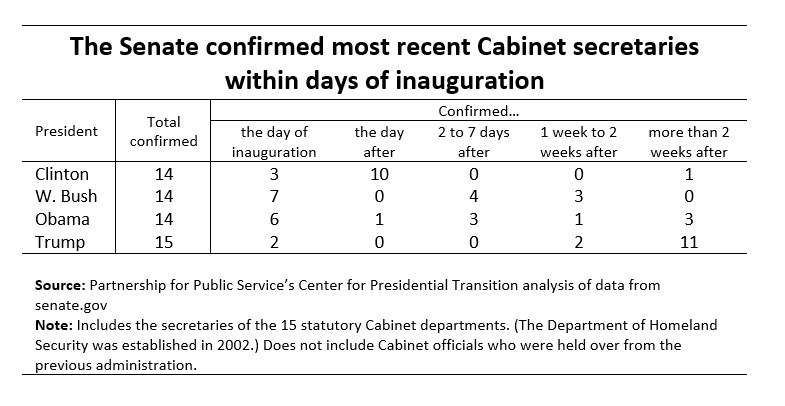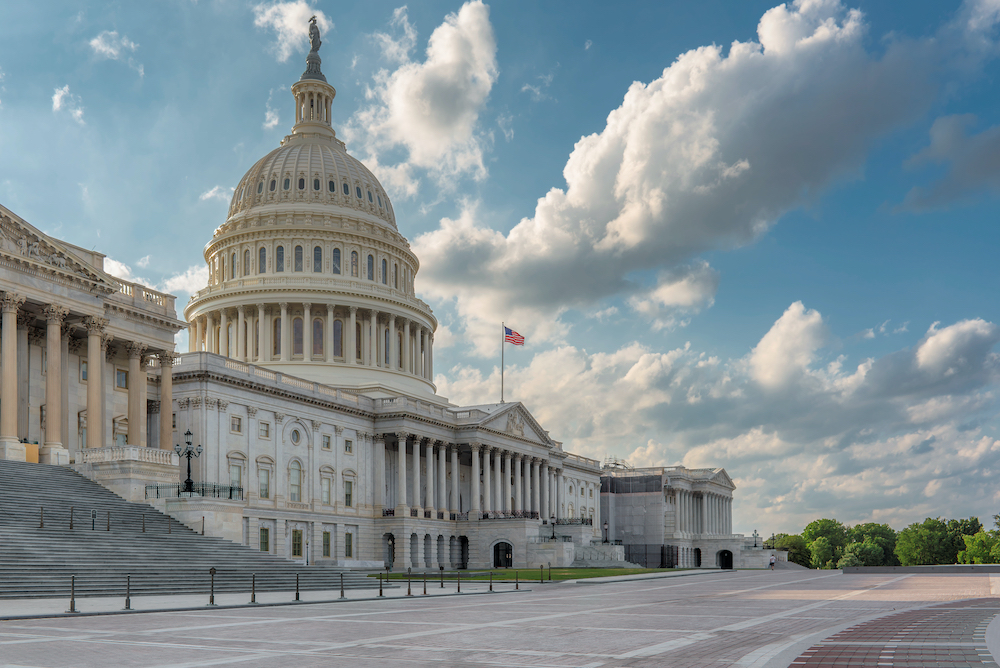Blog
January 28, 2021
Senate Taking Longer To Confirm Biden’s Cabinet Than for Most Recent Presidents
This blog was updated on February 4, 2021.
Fifteen days into President Joe Biden’s administration, the Senate has confirmed just five of his 15 statutory Cabinet secretary nominees. At a comparable time, the Senate had confirmed 90% of the Cabinet secretaries for Presidents Clinton, Bush and Obama combined.
By Paul Hitlin

Choosing 15 officials to fill their Cabinet is among the most important decisions new presidents make. The Senate plays a crucial role in considering and confirming those nominees. This year, the Senate is taking longer than it has for most other new administrations. At this time of multiple concurrent global and national crises, having a well-qualified Cabinet has taken on a new sense of urgency.
Fifteen days into Joe Biden’s presidency, the Senate has confirmed only five of 15 Cabinet secretary nominees. At a comparable time, President Bill Clinton had 13 nominees confirmed, President George W. Bush had 14 and President Barack Obama had 11. The official Cabinet consisted of 14 positions until 2002 when the Department of Homeland Security was established, and the Cabinet expanded to 15. Each president has the option to expand their Cabinet with additional members, but those positions are not part of the Cabinet as established by legislation. The Senate has confirmed one of Biden’s expanded cabinet of 23 officials – Director of National Intelligence Avril Haines.
The delays are not due to the lack of speed of Biden’s announcements. The official beginning of Biden’s transition was hampered by the delay in ascertainment – the formal decision made by the General Services Administration which triggers the government’s official preparation for a handover of power. However, Biden still announced nominations quickly. He publicly named 12 of his Cabinet choices by the end of 2020 and all 15 by Jan. 7, 2021 – about two weeks prior to his inauguration. In fact, Biden announced more nominations for Senate-confirmed positions during the time between his election and inauguration than any other president-elect.
The Senate delays began even before Biden was sworn in. The Senate can hold hearings for nominees prior to the president taking office to speed up the confirmation process. All of Clinton’s Cabinet secretary nominees had a preliminary hearing prior to Inauguration Day. The same was true for all but one of Bush’s nominees and 11 of Obama’s 14. By contrast, only five hearings were held for Biden’s picks prior to his inauguration, all of which took place the day before Biden was sworn in as president.
The confirmations of President Donald Trump’s initial Cabinet nominees took longer. Only four of his choices were confirmed within two weeks of his inauguration. However, Trump’s experience represents the exception rather than the rule. Trump’s transition team changed leadership immediately following his 2016 election, which slowed the vetting of candidates. Additionally, Trump announced nominees for secretaries of Veterans Affairs and Agriculture just days before his inauguration. Trump’s first choice for Labor secretary withdrew and other nominees did not have their paperwork completed or faced various controversies.
The reasons behind the Senate’s sluggish pace in considering Biden nominees are unclear. The Jan. 5 runoff election in Georgia, which decided party control of the Senate, is certainly a contributing factor. So is the impending impeachment trial and the prolonged negotiation over how power would be shared in an evenly divided Senate. The delayed ascertainment and refusal of the Trump to acknowledge the election results were additional factors that served as disincentives for the Senate to move forward with Biden’s nominees.
Regardless, the Senate has an obligation to act quickly to ensure that our government has qualified and accountable leadership in place, especially during times of crisis.
Now that a power-sharing agreement has been reached and committee leadership is becoming clear, the Senate has an opportunity to accelerate its consideration of Biden’s nominations. Precedents set by previous transitions suggest the Senate can – and should – move faster to fill critical vacancies so that government can serve the public effectively.



